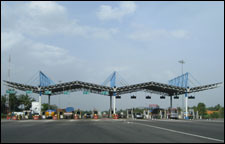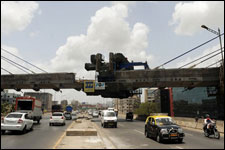 Lalit Jalan, Chief Executive Officer, Reliance Infrastructure Ltd
Lalit Jalan, Chief Executive Officer, Reliance Infrastructure Ltd
Reliance Infrastructure Ltd is India’s largest infra company with a presence in EPC, power and trading verticals. The company develops roads and highways, metro rail, airports and speciality real estate. Lalit Jalan, CEO of Reliance Infrastructure Ltd, talks about the critical aspects of highway development in India. An Interview by Jibran Buchh
Can you share your outlook on the EPC sector in India? How has it affected Reliance Infra?
The order book of EPC players across the country is under pressure, be it in terms of margins or size. Though the EPC division of RInfra has captive business from roads and power, the EPC business competes with other EPC players in the industry to get orders from our in-house projects. There are competitive EPC players who are in acute need to augment order book and hence quote unviably or give undue credit periods to customers but that is unsustainable as cutting corners can lead to poor delivery or compromising timelines.
In a sluggish growth scenario, there is high competition in the EPC space for work but our EPC division bids for contracts that can be delivered at a reasonable rate of return. Clients, be it in-house or outside, evaluate our strengths and long-term delivery history before awarding work.
 Toll roads are common in the US and Europe. Is there a need to make the public aware that better road and highway infrastructure needs to be paid for?
Toll roads are common in the US and Europe. Is there a need to make the public aware that better road and highway infrastructure needs to be paid for?
It is true that toll culture is still evolving in India. Passengers still view toll collectors with suspicion and think they take them for a ride. The common perception amongst road users is that the private contractor, who builds, operates and maintains a bridge/highway, is allowed to charge toll for excessive number of years, long after he has recovered his cost and is allowed to make indecent profit at the cost of the public. However, this is not true. The bidding process of NHAI is very transparent. Toll policy in all new projects is standardised. Due to large participants and aggressive bidding, it is not possible to make super normal profits.
We believe that toll may be acceptable provided the roads are maintained properly and the toll collection system is made efficient by keeping up with technological advances. As NHAI is coming up with centralised Electronic Toll Collection, waiting time at toll plaza will reduce, resulting in lower resistance. With the level of service improving significantly, acceptance for toll will automatically increase.
What are the hindrances RInfra is facing in development of phase-I of Mumbai Metro – Line 1?
To begin with, there was an acute shortage of adequately skilled manpower for construction, in not just the city, but the country as a whole.
There were frequent and substantial changes in project planning and timelines on account of uncontrollable factors such as a highly constrained Right of Way which was not handed over to us on time. Obtaining clearances and approvals from various authorities and agencies, including traffic, railways and CRS, was also a major challenge for us. Planning around the over-ground structures and circumnavigation of a complex network of underground utilities added on to our complexities.
We faced several constraints for approaching casting yard for workers as well. Non-availability of road connectivity for material movements along the corridor caused further delay.
There were several other restrictions such as maintaining certain noise levels for working at night and constraints in traffic diversions and barricading. High congestion in Andheri and Ghatkopar areas too added on to our woes.
Navigating the corridor through an extremely high section of the busy Western Railway tracks, where the frequency of trains is approximately 90 seconds, was very challenging as well. To add to the issue, the availability of a block on the power lines being limited to two-three hours at night made things worse.
Despite these challenges, Mumbai Metro One Pvt. Ltd has persisted with the Metro 1 construction activities at a disciplined and rapid pace making use of various new technologies and deployment of project management strategies. The project is nearing completion and once complete, it will transform the way the people travel in Mumbai.
Around 25,000-crore worth of national highways projects— constituting 23 packages and comprising 2,500 km—are awaiting funds and extension of financial closure deadline. What impact will this have on highway development?
It is true that two projects were cancelled due to non-achievement of financial closure and there are currently about 40 projects which are facing difficulty in achieving financial closure. But we believe the major reason for difficulty in not being able to achieve financial closure is not the leveraged balance sheet, but the aggressive price at which these projects were won.
Banks have become more stringent in assessing revenue projections and closely monitoring availability of land for construction. A recent Fitch report says that toll revenue of projects under their evaluation is 45 per cent below their initial projections. Lower revenue is on account of less than projected traffic or due to toll non-compliance. Hence, now banks do various scenario analyses as a part of their appraisal process. Also, recently, the Ministry of Finance has written to banks instructing them not to disburse loans unless the entire RoW has been handed over by the authority for construction. This has resulted in many projects loan getting stuck.
There is a need for the authority to take more proactive steps to provide adequate measures to plug toll leakages and to expedite land acquisition.
 Does RInfra have any specific plans for the next five years?
Does RInfra have any specific plans for the next five years?
We are at the threshold of an exciting journey and we will continue to create world-class assets to provide the platform for faster and consistent growth for India. We plan to attain best global practices and maintain the highest standards of quality, efficiency, operational performance and customer care. We will remain committed to creating greater value for all our stakeholders.
We not only want to consistently achieve high growth with the highest levels of productivity but also want to contribute towards community development and nation building by being a responsible corporate citizen, nurturing human values and concern for society, the environment and above all the people.
We are sure that the progress being achieved by Reliance Infra would bring in vibrancy and growth in the infrastructure sector and lead the way in creating inclusive growth for the nation.
Tell us about RInfra’s ongoing and planned road and highway projects.
With 11 road projects of 970 km worth 12,000 crore across six states, RInfra is at the forefront of the roads sector in India. Of these, eight projects are revenue generating. We expect 10 projects to be operational in FY13.We continue to evaluate projects in the primary as well as secondary market. We are open to taking new projects, provided they meet our criteria of benchmark returns.











